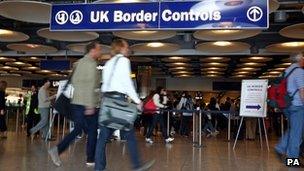Net migration 'could be underestimated', campaigners say
- Published

Immigration rose almost 4m between 1997 - 2010
Campaigners for reduced immigration to the UK have warned officials could be underestimating net migration.
Migration Watch said given that figures for the 10-year period to 2011 were proved unreliable, it feared current estimates may be wrong.
The Office for National Statistics said it was reviewing the quality of data but could not alter the past estimates.
It has already accepted it undercounted the number of immigrants from countries which joined the EU after 2004.
In December the ONS said its figures on net migration - the number of people moving to the UK minus the number leaving - for the 10 years up to 2011 had proved to be inaccurate.
This came after information from the 2011 Census showed the population of England and Wales grew by 464,000 more than the ONS estimated - mostly due to migration.
'Simply not true'
As Britain prepares to lift labour market restrictions on Bulgarians and Romanians next year, Sir Andrew Green - chairman of Migration Watch - says the same mistake on statistics could still be being made.
He has written to the UK Statistics Authority watchdog calling for a revision of previous immigration estimates.
"There is no point in burying bad news in obscure documents," Sir Andrew said. "That simply destroys trust.
"It is hard to think of set of statistics that is more important to the public."
But ONS head of population outputs Paul Vickers said: "It is simply not true to suggest that ONS has 'refused' to revise migration estimates."
An ONS spokesman told the BBC the past figures, based on surveys at ports of entry to the UK, could not be updated based on the Census statistics as the two datasets were not comparable.
Mr Vickers said improvements had been made to the ONS's data and it had already announced plans to publish a report "analysing the quality of the long-term international migration data since 2001" in the autumn.
The government has so far refused to put a figure on the number of Romanians and Bulgarians who could come to the UK when restrictions are lifted in January.
Campaigners have said as many as 250,000 people could arrive for work in the next five years.
The coalition government vowed net migration would fall to under 100,000 per year by 2015.
- Published23 May 2013
- Published7 March 2013
- Published17 January 2013